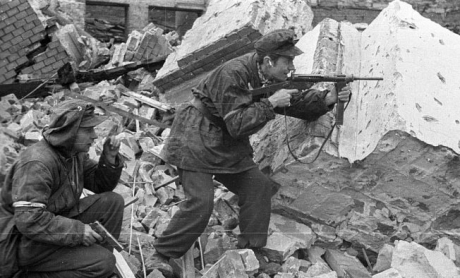Arts
You are here
Review: Forever Young: A Ghetto Story

November 14, 2022
A world premiere by Darrah Teitel
Directed by Sarah Kitz
At the Great Canadian Theatre Company in Ottawa
The Warsaw Ghetto uprising of 1943 was a high point of Jewish resistance against the Nazis, but also a moment when revolutionary politics took hold of a young generation who clearly saw they had literally nothing to lose but maybe a lot to win.
Forever Young: A Ghetto Story is a play that fictionalizes what a group of young people might have gone through on the eve of mass deportation from the Warsaw Ghetto to the Treblinka death camp.
Believe it or not, this play is also a comedy. It finds laughter, entertainment, hope and humanity in the darkest of times. But it is also a reminder that resistance to fascism and oppression can and should lead to a questioning of capitalist society itself.
The play uses chalkboard writings by the actors to remind us of all the relevant facts during the action on stage. We are reminded that 500,000 Jewish people lived within the 3km ghetto within Warsaw, which had the highest ratio of Jewish people in any city of the time. Next we see the different political players: the Jewish socialist Bund, the Polish Socialist Party, Zionists, anti-Zionists, those who supported Trotsky, and the Judenrat (Jewish Councils). The political fault lines between all of them are played out both on the chalkboard and on stage.
But it is also the story of young people trying to figure out the struggle in real time, facing starvation, illness, and loss of love and life. They debate the use of violence and non-violence in the planned uprising, Zionism and internationalism, and the extent to which they can count on the non-Jewish Polish left to stand with them. The play deals head-on with the cooperation of the Jewish establishment in what happened to ordinary Jewish people: it asserts that the Holocaust destroyed in particular the socialist left of the Jewish population in Europe. It also touches on the false hope that the Soviet Union would have saved the day: there was no true help coming from Stalinist forces for the Warsaw Ghetto or for ordinary victims of fascism anywhere.
What drives the characters is their conviction to defeat fascism but also to overcome the way that class differences - even within the Jewish community - prevent the vision of a better world. But they are also full of funny and bitter one-liners that show their desire to really live within a time they know is likely to be very short.
The action of the play is driven by debates about the goals and outcome of this life-and-death struggle. At one point the cast faces the audience and asks what was learned from this experience by other movements after them, like the Black Panthers.
And, at a critical moment, an actor in the middle of a death scene breaks character and says he doesn’t want to contribute further to the “industrialization” of this history. Then the story does a fast-forward to the aftermath of the uprising.
Finally, at the end, the cast acknowledges that the script is based on the real account by Marek Edelman, one of the five leaders of the Warsaw Ghetto uprising, from his book The Ghetto Fights, written in 1945.
Playwright Darrah Teitel notes in the program that in 2019, her friend and comrade Tamar sent to her her own copy of The Ghetto Fights which was inscribed in 2004 by her ex-partner, an anti-racist Black American activist. The inscription reads: “Even under the most horrific brutality, oppressed people resist – always have and always will. In a backwards way it is inspiring: if the resistance fighters in the ghetto could rise up and face their oppressors in the face of such hopelessness, what can we do? What can’t we do? Their spirit is present in the hearts of Iraqis and Palestinians today, and in our own hearts as well. I believe that if we draw upon it, we will be invincible.”
Teitel goes on to say that these intersecting points of geography, identity and history are a source of great hope to her, and that: “Yiddish Socialist Europe was all but murdered in the Holocaust, but the legacy of that civilization can live again if we open our eyes to it and trace our histories.”
Beyond the glimpse Marek Edelman gives us into what it was like, one can only imagine and fictionalize about the young people who fought back with such courage. But in a play, you can put an intimate human face on those who should be forever remembered for fighting fascism and for a socialist future – both as necessary now as they were then.
Forever Young, A Ghetto Story is part of the Great Canadian Theatre Company’s 2022-2023 season inspired by struggles for social justice, titled Behind the Scenes at the Revolution.
Forever Young, A Ghetto Story runs until November 20 at the GCTC in Ottawa.
Section:
Topics:









